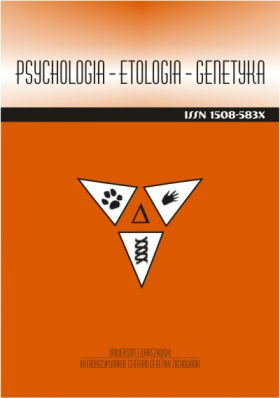Dwie strony medalu? Impulsywność oraz skłonność do ryzyka w kontekście Regulacyjnej Teorii Temperamentu oraz efektywności podejmowania decyzji
Two sides of the same coin? Impulsivity and venturesomeness in the context of Regulative Theory of Temperamentand decision making effectiveness
Author(s): Karol LewczukSubject(s): Psychology
Published by: Wydawnictwo Naukowe Scholar Sp. z o.o.
Keywords: impulsivity; venturesomeness; Regulative Theory of Temperament; temperament; decision making
Summary/Abstract: In order to characterize functionally Eysenck’s impulsivity and venturesomeness, the authors seek to study its relationship with Strelau’s Regulative Theory of Temperament traits and to correlate both dimensions with a questionnaire of their own design that measures subjective decision making effectiveness. One hundred and two High School students took part in the study, which consisted of three questionnaires: FCZ-KT, IVE, and self-made Decision Making Scale. The results show significant positive correlations between venturesomeness and activity, briskness and endurance, as well as negative correlation with emotional reactivity. Impulsivity is associated only with activity. This indicates that the regulative significance of trait venturesomeness is much stronger than trait impulsivity. Although Eysenck’s impulsivity corresponds directly to the effectiveness of decision making, the authors did not find significant correlation between these two dimensions (instead, correlation was significant for venturesomeness). Further analysis reveals a pattern of significant correlations between temperamental traits (Regulative Theory of Temperament) and subjective effectiveness of decision making, as well as significant relationships on the level of Hippocrates’ four personality types. Venturesomeness is positively correlated with the capacity to process stimulation and is greater in the sanguine than in the melancholic group. Impulsivity is not related to personality types.
Journal: Psychologia-Etologia-Genetyka
- Issue Year: 2015
- Issue No: 31
- Page Range: 37-54
- Page Count: 18
- Content File-PDF

